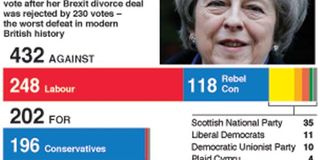Analysts: Brexit vote results show powers of Parliament

What you need to know:
- MPs from young democracies, such as Tanzania, should learn from the UK on the independence of Parliament
Dar es Salaam. Analysts say the rejection of the Brexit deal by the British Parliament on Tuesday was possible only because of the strenght of the legislature in the democratic make-up of the UK.
Speaking to The Citizen in separate interviews yesterday, they said African legislative assemblies, Tanzanian Parliament included, have a lesson to learn from the independence of the British Parliament.
The British Parliament, on Tuesday, rejected Prime Minister’s Brexit deal, putting its plans to leave the European Union (EU) into further chaos.
The MPs voted 432 to 202 against May’s plan for taking Britain out of the EU, the biggest parliamentary defeat for a government in modern British political history.
When reached for comments yesterday, a political analyst at the Ruaha Catholic University (Rucu), Prof Gaudens Mpangala said the outcome of the vote manifested the separation of powers at its best.
“In any case the Parliament must be set free and independent to exercise its fuctions. When the Parliament is free and independent, it will be able to reject the controversial government’s decisions that can, otherwise, cost the country in future,” Prof Mpangala noted.
Commenting on the ongoing saga between the Controller and Auditor General (CAG) Prof Mussa Assad and the Speaker of National Assembly Job Ndugai, Prof Mpangala said; “I support the CAG remarks on the Parliament’s lack of “teeth”, and I condemn plans to interrogate the CAG over his remarks. It is unacceptable.”
Prof Mohamed Bakari, a political science lecturer from the University of Dar es Salaam (UDSM), said the vote shows a clear difference between legislators from mature democracy and those from young democracies such as ours.
“UK MPs care more about national interests as opposed to loyalty to their political parties,” Pro Bakari noted. Prof Bakari further noted that in order to reinforce democracy and justice in the country, the key institutions - pillars of the government - must exercise their independence.
“For instance, the outstanding unresolved challenges to the Tanganyika and Zanzibar Union and the cry for the new Constitution, are yet to be addressed. The Parliament must press the government to take action on national matters,” said Prof Bakari.
The chairman of the Chama cha Ukombozi wa Umma (Chaumma), Mr Hashim Rungwe, who was among the eight presidential aspirants in the 2015 General Election also asserted the need for the Tanzanian Parliament to learn from their British counteparts.
“It is a lesson that young democracies, including Tanzania, should learn, that is, putting national interests first and foremost,” he noted. He cited once and again the Tanzanian Parliament has passed laws that had to be changed later for being lopsided vis a vis interests of the nations.
“There are many laws that have been passed by the Parliament that hurt the interests of the nation. This signifies that our Parliament is not exercising its responsibilities effectively,” he noted.




